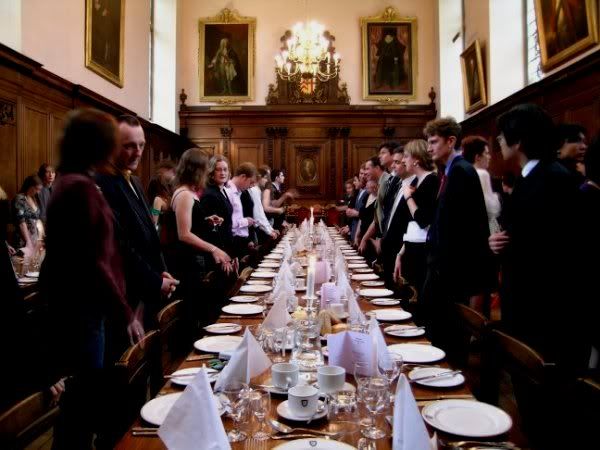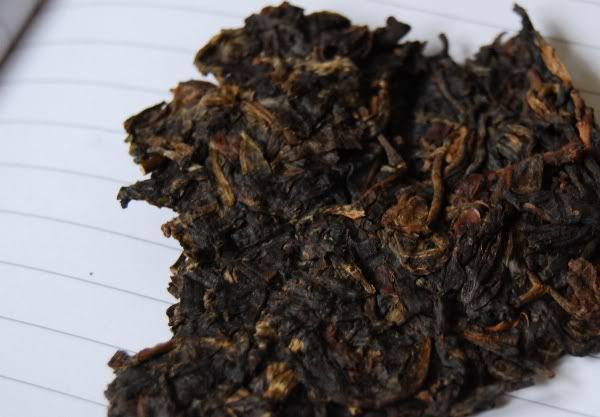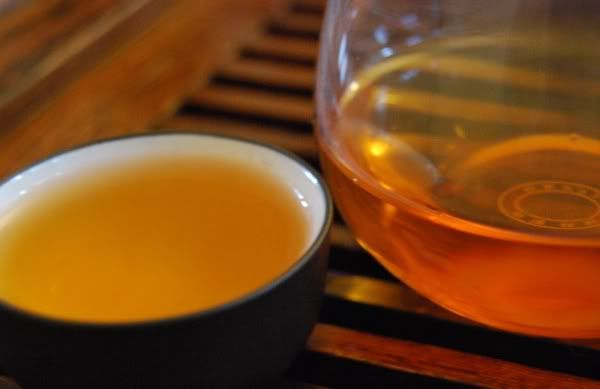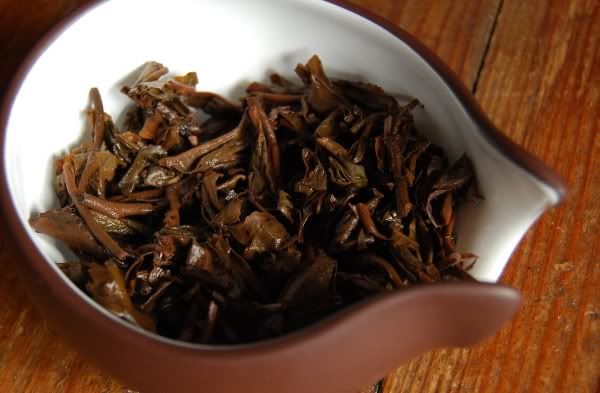I was at an interview two months ago, and the sage old professor presiding over the interview panel gave me a mischievous look (after I had just given a science-based presentation) and said,
While digesting the interview in retrospect, I realised that the most successful people I'd admired before (academics, industrialists, or otherwise) spent a lot of time emphasising the "soft skills". They were very smooth, in dealing with everyone from the nurse on the hospital floor to the CEO of a national body. The soft skills aren't explicitly taught at university, excepting the odd random little course, and instead they slip in unnoticed by other means. What other means?
My university attracts quite a lot of criticism for being what the critics call "nothing but a dining club". To an arguable extent, this is based on truth: the social aspect of academic life with people outside your discipline is emphasised, with most members of the university having formal dinners at least once or twice per week during term. It's good fun, and you get to talk to people who aren't engineers, which is great. Engineers are nice people, but when you've spent all day with them, a change is welcome.
It's at the dining table that I reckon you get a surprisingly large amount of practice at the "soft skills" to which the old professor was alluding. The more you speak to people - particularly new, interesting people that you've never met - the easier it becomes, and it builds confidence. Most importantly, it knocks the rough edges off you. It helps you to get on with strange people. It makes you less of a pain in the backside.
(N.B., I'm still a huge pain in the backside, but greatly reduced from the enormous pain in the backside that I once was.)
"How important is it, do you think, to be able to communicate and discuss your work with new people, rather than just researching? That is, what importance would you place on the 'soft skills', such as discussion and conversation, in comparison to your scientific skills?"It's a bombshell question, which interviewers sometimes like to drop and then walk away from, to see what manner of carnage is caused after the detonation. I blagged my way through, to the panel's seeming approval (got the job!), but remember using the dreadful words "proselytise" and "evangelise" with a straight face, much to my later embarrassment.
While digesting the interview in retrospect, I realised that the most successful people I'd admired before (academics, industrialists, or otherwise) spent a lot of time emphasising the "soft skills". They were very smooth, in dealing with everyone from the nurse on the hospital floor to the CEO of a national body. The soft skills aren't explicitly taught at university, excepting the odd random little course, and instead they slip in unnoticed by other means. What other means?
My university attracts quite a lot of criticism for being what the critics call "nothing but a dining club". To an arguable extent, this is based on truth: the social aspect of academic life with people outside your discipline is emphasised, with most members of the university having formal dinners at least once or twice per week during term. It's good fun, and you get to talk to people who aren't engineers, which is great. Engineers are nice people, but when you've spent all day with them, a change is welcome.
It's at the dining table that I reckon you get a surprisingly large amount of practice at the "soft skills" to which the old professor was alluding. The more you speak to people - particularly new, interesting people that you've never met - the easier it becomes, and it builds confidence. Most importantly, it knocks the rough edges off you. It helps you to get on with strange people. It makes you less of a pain in the backside.
(N.B., I'm still a huge pain in the backside, but greatly reduced from the enormous pain in the backside that I once was.)
We recently had the "Going Down Dinner" at my college, which celebrates those who are leaving the college ("going down") this year, including your humble correspondent. We have loads of Americans with us, and so the name "Going Down Dinner" is understandably very amusing to them, given its modern meaning over there.
Sniggering aside, it's a great opportunity to see all your old chums from the past 3-5 years, and wish them well in their lives after leaving. It's a long old event, followed by speeches from various folk in various states of inebriation, concluding with the college Master wishing us all the best. The Master is a lovely old chap, a near-retired geography professor, and I happened to be sitting opposite him this time, with a few other doctoral students.
At the end of the dinner, as we've done each week, we rose and stood behind our chairs ready for the concluding Grace. The Master, after hitting the table with his gavel:
The drunken and burly crowd, superbly intoxicated with port, shouted "Boo! Traitor!" And then the Master passed me the Grace.
One and a half paragraphs of Latin.
Written in heaven-knows-what script.
While inebriated.
Ouch.
Sniggering aside, it's a great opportunity to see all your old chums from the past 3-5 years, and wish them well in their lives after leaving. It's a long old event, followed by speeches from various folk in various states of inebriation, concluding with the college Master wishing us all the best. The Master is a lovely old chap, a near-retired geography professor, and I happened to be sitting opposite him this time, with a few other doctoral students.
At the end of the dinner, as we've done each week, we rose and stood behind our chairs ready for the concluding Grace. The Master, after hitting the table with his gavel:
"And now, the Grace. This time, it will be read by a departing student, who is defecting to another college*."*Which is about 200 yards away.
The drunken and burly crowd, superbly intoxicated with port, shouted "Boo! Traitor!" And then the Master passed me the Grace.
One and a half paragraphs of Latin.
Written in heaven-knows-what script.
While inebriated.
Ouch.

You must be joking.
The next morning I was in dire need of a cure. The mighty ST came to my rescue - thankyouthankyouthankyou.
This dark little fellow is from 2002, and comes as a pair of zhuancha [djoo-an cha / bricks] wrapped in bamboo. ST grabbed them for Singapore$40, which comes to about US$27. The "bargain" radar is lighting up.
Tight! Tight, tight. The compression is old-school Xiaguan, and constructed of tiny leaves, as pictured above. It has a superb woody aroma - clean and sharp, and indicative of good* storage.
*I say "good", but I mean "dry". I like wet-storage, too, as I'm sure you know.
Tight! Tight, tight. The compression is old-school Xiaguan, and constructed of tiny leaves, as pictured above. It has a superb woody aroma - clean and sharp, and indicative of good* storage.
*I say "good", but I mean "dry". I like wet-storage, too, as I'm sure you know.
That woodiness comes out in the aroma, which is clean and sweet. Shown above, the soup already has a decent orange tinge to it - presumably not achieved through a late shaqing, given the cleanliness, sweetness, and lack of malty "redness" in the flavour. Good stuff.
I love the spicy, woody flavour, which swells to a very decent huigan. ST called this "quite a mouthful", and it definitely packs a lot in. Sweetness above, plenty of goodly scents left behind to dwell in the nose. Again, the tetsubin has complemented the tea very well, with noticeable notes from the kettle smoothing out the edges and making it almost creamy.
"This is very clean and smooth - can we get some?" sayeth She.
No roughness, just plenty of smooth wood, lasting well out past the 15th infusion. At $13.50 per 250g brick, this is a real bargain. Many thanks to ST for sending this my way... hopefully to be joined by a few of their brethren!
A real soother after a torrid, yet highly enjoyable, Going Down.
"This is very clean and smooth - can we get some?" sayeth She.
No roughness, just plenty of smooth wood, lasting well out past the 15th infusion. At $13.50 per 250g brick, this is a real bargain. Many thanks to ST for sending this my way... hopefully to be joined by a few of their brethren!
A real soother after a torrid, yet highly enjoyable, Going Down.





Hi, thanks for sharing your tasting notes. I live in S'pore and will be glad to get this tea for you (if still available) if you can let me where to get it. Regards, Keng.
ReplyDeleteToo bad this is a private collection. Not available to the general public I am afraid.
ReplyDelete--ST
Very kind, though, Keng - thanks muchly for the offer!
ReplyDeleteI'm impressed that you had the presence of mind to photograph the text of the Grace. It really does make your point. Even if I did know any Latin - and I don't - that would be rough. How did you manage?
ReplyDeleteDear Carla,
ReplyDeleteThat's an insular script I grabbed for dramatic effect - the real thing is just copperplate gothic (curly writing in the Germanic style). Sing in enough choirs and you can read it directly from the subconscious :)
(Reading things directly from the subconscious comes in handy after 2 litres of port.)
Best,
D :)
although we do have a distinctly unorthodox Grace, written by one of the founding Fellows back in the day. Amusingly, the Grace went missing for a period of 26 years, and was discovered last year at dinner (I was a few seats down) when one of our old fellows found a copy of it in the inside pocket of his dinner jacket.
ReplyDeleteThis man had not cleaned his DJ in over quarter of a century.
Congrats on finding a new source of food and tea! Which college is so lucky?
ReplyDeleteDear Marshaln,
ReplyDeleteThanks! Same university, different college - the new one is named after a manufacturer of breakfast cereals*. Heh.
Best,
Hobbes
*and one of the largest philanthropic foundations in the USA, but breakfast cereals are funnier.
Well, I totally fell for it! Seems exactly the sort of thing an old professor might do to a young upstart. Trying to imagine what I might do if cornered in such a situation myself, all I could come up with was a straight-faced delivery of a regular grace in pig-Latin while pretending to read from the paper: Essblay usay ouray ordlay anday hesetay hytay iftsgay hichway eway arehay aboutay otay eceiveray romfray hytay ountybay. Hroughtay hristcay ouray ordlay Amenay.
ReplyDeleteHow strange: I was a student at Clare and now work at New College - so many photos of places that I hold dear!
ReplyDelete